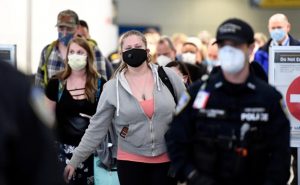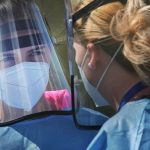Study: 30K out-of-state doctors, nurses helped NJ Fight COVID
 Two main groups used the temporary licenses — the hands-on nurses and respiratory therapists who came to help with hospital care, and the physicians and mental health providers who provided care remotely — on the telephone or via FaceTime or Zoom — for both COVID and non-COVID patients.
Two main groups used the temporary licenses — the hands-on nurses and respiratory therapists who came to help with hospital care, and the physicians and mental health providers who provided care remotely — on the telephone or via FaceTime or Zoom — for both COVID and non-COVID patients.
Many who answered the call, in fact, never left their home states. They were temporarily licensed in New Jersey but worked from elsewhere to care for New Jersey patients. This was especially true of mental health care providers. And although the program was intended to address the need for COVID care, it also expanded access to non-COVID care.
Here’s who got the temporary licenses:
- Thirty-five percent were nurses and nurse practitioners, 27% were physicians, 26% mental health providers and 2% respiratory therapists.
- They were from every state, but the largest numbers came from New York, Pennsylvania and Delaware, along with Florida and California.
- They conversed with patients in 36 languages.
- They were mostly non-Hispanic white women ages 40 to 59.
- They cared for Medicare and Medicaid patients as well as those who were privately insured.
- About 30% of those who got the licenses didn’t use them.
- The use of telehealth was vital to make the program work, especially as the demand for mental health services escalated. Before the pandemic, doctors and other providers needed to have seen a patient at least once in the office before they could bill for telehealth visits.
- Pandemic-inspired changes in federal law, however, allowed practitioners to take on new patients through telehealth. As a result, telehealth’s use skyrocketed. From June to October 2020, a national study found, 46% of behavioral health visits were virtual, compared with 0.4% the previous year; 22% of medical visits were virtual in the same period, compared with 0.3% the year before.
- The temporary licensure for out-of-state professionals was the largest of several emergency measures adopted in New Jersey to boost the workforce. Retirees who’d left their professional health care employment within the previous five years were enabled to return to work, and nursing students and others within a few months of graduation were placed in non-front-line jobs. Doctors from other countries also had an easier time applying to practice in New Jersey.
- Plus, the U.S. military and the National Guard sent staff to the state’s nursing homes and a few hospitals, while other hospitals and health systems paid millions of dollars to travel nurse agencies to fill the gaps.
· Two caveats
- New Jersey’s program for out-of-state medical providers offers lessons for what to do in future pandemics, the authors said. But there are two caveats.
- First, Murphy asked for help when COVID-19 cases were concentrated in New York, New Jersey and Washington state. In a more widespread emergency, medical workers would be needed at home and might not be so able to help elsewhere.
- Second, the study didn’t look into the quality of care delivered by the temporary licensees. No information currently is available about whether any were disciplined by regulatory boards for their work in New Jersey. The Division of Consumer Affairs did not respond to a question about whether such actions had been taken.
- The out-of-state doctors, nurses and counselors who rode to the rescue were a short-term fix. The program aimed “to help address workforce needs during a dire time,” Nguyen said. “And yes, it did help.”
- Now New Jersey and most states face a more intractable long-term shortage of health care professionals, as their ranks have been depleted by resignations and early retirements after the stress of the pandemic.
- And as of Aug. 1, only respiratory therapists from other states can get a temporary license. Everyone else has to apply through the normal process.
(This story originally appeared in NorthJersey.com.)




